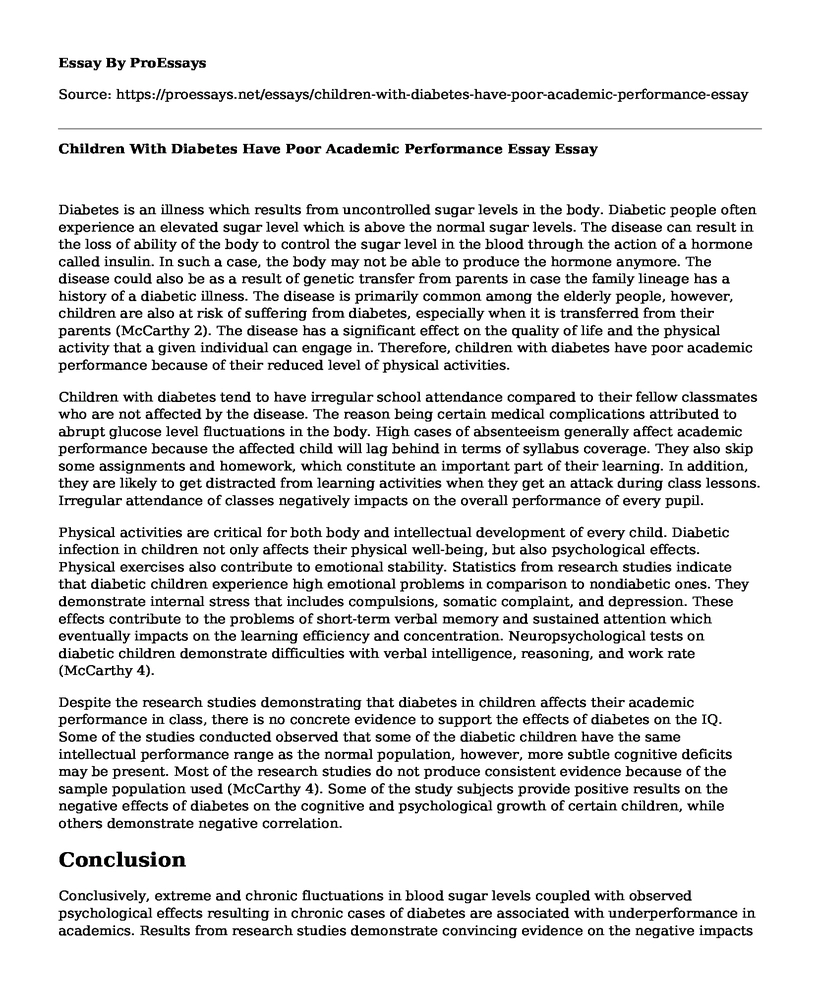Diabetes is an illness which results from uncontrolled sugar levels in the body. Diabetic people often experience an elevated sugar level which is above the normal sugar levels. The disease can result in the loss of ability of the body to control the sugar level in the blood through the action of a hormone called insulin. In such a case, the body may not be able to produce the hormone anymore. The disease could also be as a result of genetic transfer from parents in case the family lineage has a history of a diabetic illness. The disease is primarily common among the elderly people, however, children are also at risk of suffering from diabetes, especially when it is transferred from their parents (McCarthy 2). The disease has a significant effect on the quality of life and the physical activity that a given individual can engage in. Therefore, children with diabetes have poor academic performance because of their reduced level of physical activities.
Children with diabetes tend to have irregular school attendance compared to their fellow classmates who are not affected by the disease. The reason being certain medical complications attributed to abrupt glucose level fluctuations in the body. High cases of absenteeism generally affect academic performance because the affected child will lag behind in terms of syllabus coverage. They also skip some assignments and homework, which constitute an important part of their learning. In addition, they are likely to get distracted from learning activities when they get an attack during class lessons. Irregular attendance of classes negatively impacts on the overall performance of every pupil.
Physical activities are critical for both body and intellectual development of every child. Diabetic infection in children not only affects their physical well-being, but also psychological effects. Physical exercises also contribute to emotional stability. Statistics from research studies indicate that diabetic children experience high emotional problems in comparison to nondiabetic ones. They demonstrate internal stress that includes compulsions, somatic complaint, and depression. These effects contribute to the problems of short-term verbal memory and sustained attention which eventually impacts on the learning efficiency and concentration. Neuropsychological tests on diabetic children demonstrate difficulties with verbal intelligence, reasoning, and work rate (McCarthy 4).
Despite the research studies demonstrating that diabetes in children affects their academic performance in class, there is no concrete evidence to support the effects of diabetes on the IQ. Some of the studies conducted observed that some of the diabetic children have the same intellectual performance range as the normal population, however, more subtle cognitive deficits may be present. Most of the research studies do not produce consistent evidence because of the sample population used (McCarthy 4). Some of the study subjects provide positive results on the negative effects of diabetes on the cognitive and psychological growth of certain children, while others demonstrate negative correlation.
Conclusion
Conclusively, extreme and chronic fluctuations in blood sugar levels coupled with observed psychological effects resulting in chronic cases of diabetes are associated with underperformance in academics. Results from research studies demonstrate convincing evidence on the negative impacts of diabetes on academic performance among children. Many children who suffer from diabetes do not live a normal life and their learning activates and class performance are affected by cognitive deficits that result from diabetic effects. Therefore, it is important to note that children with diabetes have poor academic performance. This observation provides better opportunities for future research on the possible solutions for improving the affected academic performance of diabetic children.
Work Cited
McCarthy, Ann Marie, et al. "Effects of diabetes on learning in children." Pediatrics 109.1 (2002): e9-e9.
Raloff, Janet. "Helping bats hold on: Scientists seek a savior as a deadly fungal pandemic explodes through vulnerable colonies." Science News 180.6 (2011): 22-25.
Cite this page
Children With Diabetes Have Poor Academic Performance Essay. (2022, May 17). Retrieved from https://proessays.net/essays/children-with-diabetes-have-poor-academic-performance-essay
If you are the original author of this essay and no longer wish to have it published on the ProEssays website, please click below to request its removal:
- Research Paper on Diabetes: Biology of Disease
- Essay Sample on Urinalysis
- HFCS Has Contributed to Increased Body Weight of Americans - Essay Sample
- Under-Five Mortality: Impact on Child Growth - Research Paper
- COVID-19 Pandemic's Impact: Global Economic Crisis - Essay Sample
- Free Essay Sample on Education Inequality: Barriers To Access and Success
- Understanding External Triggers and Psychological Effects of Electronic Addiction - Free Report







